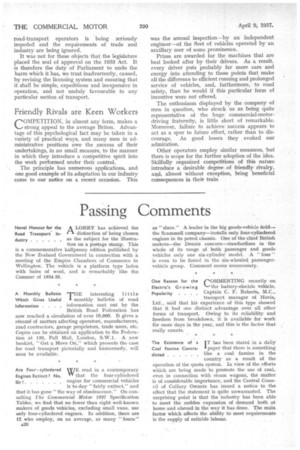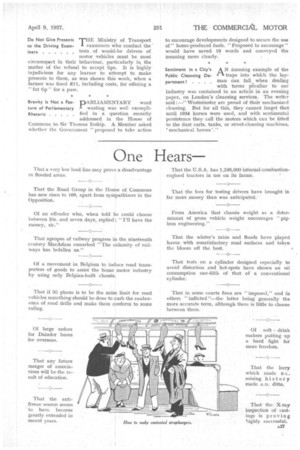Passing Comments
Page 28

Page 29

If you've noticed an error in this article please click here to report it so we can fix it.
Novel Honour for the A LORRY has achieved the Road Transport. In.rx distinction of being chosen
dustry as the subject for the illustra tion on a postage stamp. This is a commemorative halfpenny edition published by the New Zealand Government in connection with a meeting of the Empire Chambers of Commerce in Wellington. The vehicle is a platform type laden with bales of wool, and is remarkably like the Commer of 1934-35.
A Monthly Bulletin 'THE interesting little Which Gives Useful 1 monthly bulletin of road
Information . . . information sent, out by the British Road Federation has now reached a circulation of over 10,000. It gives a résumé of matters affecting operators, manufacturers, road contractors, garage proprietors, trade users, etc. Copies can be obtained on application to the Federation at 120, Pall Mall, London, S.W.1. A new booklet, "Get a Move On," which presents the case for road transport pictorially and humorously, will soon be available.
Are Four cylindered WE read in a contemporary Engines Extinct ? No, " that the four-cylindered Sir engine for commercial vehicles is to-day "fairly extinct," and that it has gone "the way of obsolescence." On consulting The Commercial Motor 1937 Specification Tables, we find that no fewer than eight well-known makers of goods vehicles, excluding small vans, use only four-cylindered engines. In addition, there are 12 who employ, on an average, as many "fours"
as "sixes." A leader in the big goods-vehicle field— the Scamraell company—installs only four-cylindered engines in its petrol chassis. One of the chief British makers—the Dennis concern—standardizes in the whole of its range of both passenger and goods vehicles only one six-cylinder model. A " four " is even to be found in the six-wheeled passengervehicle group. Comment seems unnecessary.
COMMENTING recently on the battery-electric vehicle, Captain C. F. Roberts, M.C., transport manager of Hovis, Ltd., said that his experience of this type showed that it had one distinct advantage over all other forms of transport. Owing to its reliability and freedom from breakdown, it is available for work far more days in the year, and this is the factor that , really counts.
One Reason for the Electric's Growing Popularity . .
The Existence of a IT has been stated in a daily Coal Famine Contraipaper that there is something
dieted like a coal famine in. the
country as a result of the operation of the quota system. In view of the efforts which are being made to promote the use of coal, even in connection with steam wagons, the matter is of considerable importance, and the Central Council of Colliery Owners has issued a notice to the effect that the statement is quite unwarranted. The surprising point is that the industry has been able to meet the sudden expansion of demand both at home and abroad in the way it has done. The main factor which affects the ability to meet requirements is the supply of suitable labour.
Do Not Give Presents THE Ministry of Transport to the Driving ExamL examiners who conduct the iners tests of would-be drivers of motor vehicles must be most circumspgct in their behaviour, particularly in the matter of the refusal to accept tips. It is highly injudicious for any learner to attempt to make presents to them, as was shown this week, when a farmer was fined 211, including costs, for offering a "fat tip' for a pass.
Brevity is Not a FeaDARLIAMENTARY word ture of Parliamentary A wasting was well exempli
Rhetoric fied in a question recently addressed in the House of Commons to. Sir Thomas Inskip. A Member asked whether the Government "proposed to take action to encourage developments designed to secure the use of" home-produced fuels. "Proposed to encourage" would have saved 10 words and conveyed the meaning more clearly.
AN amusing example of the traps into which the layman can fall when dealing with terms peculiar to our industry was contained in an article in. an evening paper, on London's cleansing services. The writer said :—" Westminster are proud of their mechanized cleaning. But for all this, they cannot forget that until 1934 horses were used, and with sentimental persistence they call the motors which can be fitted to the dust carts, tanks, or street-cleaning machines,
mechanical horses '."
Sentiment in a City's Public Cleansing Department I




















































































